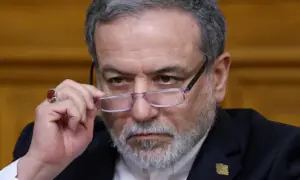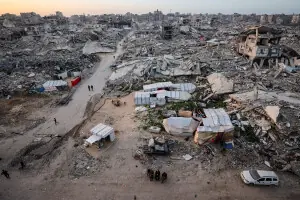Iraq expels Sweden envoy after another act of Quran’s desecration in Stockholm
5 min readIraq on Thursday expelled Sweden’s ambassador after a man desecrated the Holy Quran at a Stockholm demonstration just hours after the Swedish embassy in Baghdad was torched over the planned protest.
Sweden-based Iraqi refugee Salwan Momika, 37, desecrated the Holy Quran but left the protest without burning it, just weeks after he set fire to pages of the holy book outside Stockholm’s main mosque.
Sweden and other European countries have previously seen protests where far-right and other activists, citing free speech protections, damage or destroy religious symbols or books, commonly sparking protests and heightening diplomatic tensions.
Around the time of Thursday’s protest in Stockholm, Iraqi Prime Minister Mohamed Shia al-Sudani “instructed the Swedish ambassador in Baghdad to leave Iraqi territory”, according to a statement by his office.
It said the decision was “prompted by the Swedish government’s repeated permission for the burning of the [Holy] Quran, insulting Islamic sanctities and the burning of the Iraqi flag”.
Overnight protesters had breached and set fires within the compound of the Swedish embassy in Baghdad and clashed with riot police, prompting an emergency meeting with the prime minister.
The Iraqi government strongly condemned the embassy attack but also issued a warning to Sweden if it allowed the second Holy Quran-burning protest to go forward.
Baghdad had informed Stockholm “that any recurrence of the incident involving the burning of the Holy Qoran on Swedish soil would necessitate severing diplomatic relations,” according to a statement from Sudani’s office.
Protecting the right to protest
Swedish police had granted a permit for the protest in line with Swedish legislation on the rights to freedom of assembly and speech.
“The constitution states that a lot is needed to deny a person a permit for a public gathering so the day before yesterday we granted a permit for a private individual to protest,” Ola Osterling with the Stockholm police told AFP.
On June 28, Salwan Momika also burnt pages of the Holy Quran, outside a Stockholm mosque, sparking a wave of indignation and anger across the Muslim world.
Hundreds massed at the Baghdad embassy, as they had done in response to the previous Stockholm protest, scaled the walls and torched parts of it.
Rock-throwing protesters then clashed with Iraqi riot police who used electric batons and water cannon to disperse them.
One protester, Hassan Ahmed, told AFP that “we mobilised today to denounce the burning of the Holy Quran, which is all about love and faith”.
Some raised the holy book in the air, others held up portraits of Sadr and of his late father, Mohamed al-Sadr, a revered cleric in the majority Shia country.
Calm had returned by morning, when police blocked the road leading to the embassy, and the full extent of the fire damage was not yet clear.
Sweden’s foreign ministry told AFP that all of its employees in Baghdad were “safe” during the unrest.
Swedish Foreign Minister Tobias Billstrom later said Iraq’s charge d’affaires would be summoned.
“What has happened is completely unacceptable and the government condemns these attacks in the strongest terms,” he said in a statement.
“Iraqi authorities have an unequivocal obligation to protect diplomatic missions and personnel under the Vienna Convention.”
‘Serious security breach’
Sudani “strongly condemned burning the Swedish embassy in Baghdad, viewing it as a serious security breach requiring immediate action”, the Iraqi government statement said.
“Those accountable for security must be held responsible,” it added, as an Iraqi security source told AFP about 20 protesters had been taken into custody.
Iraq also said it “reaffirms its commitment to ensuring the security and protection of all diplomatic missions, vowing to confront any attacks targeted at them”.
PM Shehbaz calls on OIC, civilised world to come forward
Prime Minister Shehbaz Sharif has called upon the Organisation of Islamic Cooperation and the civilised world to come forward and take steps to put an end to such “abominable practices” as the desecration of the Holy Books.
“No civilized society will allow the desecration of the holy personages, symbols and the Divine Books in the name of freedom of expression,” he tweeted. “The grant of permission to desecrate the Holy Quran, Torah & Bible is part of a sinister, vile & despicable agenda whose sole aim could be to threaten world peace.”
Pakistan condemns desecration of Quran
Pakistan condemned in the “strongest possible terms” yet another Islamophobic act of public desecration of the Holy Quran in Sweden.
“Permission to carry out premeditated and provocative acts of religious hatred cannot be justified under the guise of freedom of expression, opinion and protest,” the Foreign Office spokesperson said in a statement on Thursday.
The spokesperson said that international law obliged states to prevent and prohibit deliberate incitement to “hatred, discrimination and violence” on the basis of religion or belief.
It added that the recurrence of such Islamophobic incidents, which have hurt the sentiments of over two billion Muslims worldwide, was both “legally and morally reprehensible”.
The spokesperson reiterated Pakistan’s call on the international community to unequivocally condemn these Islamophobic acts, isolate those who stoke religious hatred, build deterrence and promote mutual respect, tolerance and harmony among religions, faiths and cultures.
“We expect the Swedish authorities to take all measures necessary to stop such acts of hatred and incitement. Pakistan’s concerns about the latest incident are being conveyed to the Swedish authorities,” the FO spokesperson added.
Earlier protests
Late last month, Sadr called for protests against Sweden and the expulsion of the Swedish ambassador after the Holy Quran burning in Stockholm by an Iraqi man.
Swedish police charged the man with agitation against an ethnic or national group. In a newspaper interview, he described himself as an Iraqi refugee seeking to ban the Holy Quran.
Two major protests took place outside of the Swedish embassy in Baghdad in the aftermath of that burning, with protesters breaching the embassy grounds on one occasion.
The governments of several Muslim countries, including Iraq, Turkey, the United Arab Emirates, Jordan and Morocco issued protests about the incident, with Iraq seeking the man’s extradition to face trial in the country.
The United States also condemned it, but added that Sweden’s issuing of the permit supported freedom of expression and was not an endorsement of the action.
Pakistan also strongly condemned the “despicable act” of the desecration of the Holy Quran.
The Foreign Office had stated that such intentional incitement to discrimination, hatred, and violence cannot be justified under the pretext of freedom of expression and protest.
For the latest news, follow us on Twitter @Aaj_Urdu. We are also on Facebook, Instagram and YouTube.



























Comments are closed on this story.